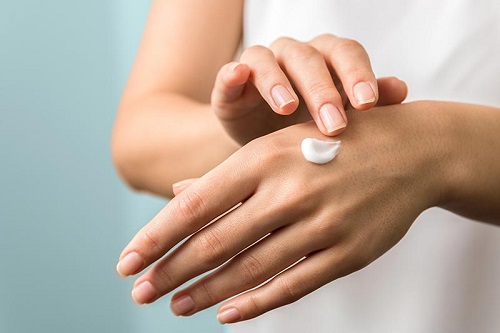‘Tea Tree Oil Burned My Skin! What Can Help?‘ If this is something you are wondering, here’s an informative guide for you!
Dealing with a skin reaction, especially when it’s caused by a natural remedy like tea tree oil, can be unsettling. So if you are wondering—Tea Tree Oil Burned My Skin! What Can Help? Here’s the answer!
Have a Look at the Benefits of Castor Oil and Tea Tree for Hair Growth here
Can Tea Tree Oil Burn Skin?
Yes, tea tree oil can burn skin.
While tea tree oil is a potent anti-bacterial and anti-fungal agent, it contains compounds that when used in concentrated forms can cause skin irritation or chemical burns, particularly in those with sensitive skin.
According to a study published in the “Journal of Essential Oil Research” there are instances where topical application of tea tree oil has resulted in skin irritation and systemic hypersensitivity reactions. This is primarily due to the presence of compounds such as terpinen-4-ol, which, while contributing to tea tree oil’s antimicrobial properties, can also be harsh on the skin.
Another report highlights that any essential oil, including tea tree oil, should be used with caution on the skin, especially when it’s not diluted properly. Undiluted tea tree oil poses a higher risk of skin irritation and burns because of its potency.
The findings indicate that while tea tree oil is beneficial for various dermatological conditions due to its antiseptic properties, improper use can lead to adverse skin reactions. It is thus essential to use tea tree oil in appropriate concentrations and to follow safety guidelines for its application to prevent potential skin burns.
Can You Mix Castor Oil with Tea Tree Oil? Learn here
Tea Tree Oil Burned My Skin! What Can Help?
Upon realizing that tea tree oil has caused a skin reaction, taking immediate steps can make a significant difference in minimizing discomfort and preventing further aggravation.
1. Immediate Action
- As soon as you notice a reaction, stop using tea tree oil. Continuing to apply the oil can increase irritation and lead to more severe burns.
- Rinse with cool water to soothe the burn and reduce inflammation. It also helps to remove any remaining oil on the skin’s surface, minimizing further absorption.
2. Follow-up Care
- Clean with a mild cleanser. It will help remove any oil residue without stripping the skin. It’s essential to avoid further irritation that harsh soaps or scrubbing actions could cause.
- Applying a cool, moist cloth to the affected area can provide relief. The coolness reduces swelling and pain by constricting blood vessels and calming the inflammatory response.
3. Additional Skin Care Measures
- This topical steroid such as Hydrocortisone cream helps by reducing the immune response that causes inflammation and itching. It’s a short-term solution to ease discomfort and should be used sparingly.
- You can also use Aloe vera, if you prefer natural remedies. It has compounds that provide a soothing effect and help with skin healing. It’s a natural way to moisturize and restore the skin’s barrier without causing further irritation.
Discover here About Using Tea Tree Oil for Bug Bites
Tips to Prevent Future Reactions
Preventing future skin reactions from tea tree oil is crucial to ensure your skin remains healthy and irritation-free.
1. Dilute the Oil
First and foremost, always dilute essential oils, including tea tree oil, with a carrier oil before applying them to your skin. A general rule is 1-2 drops of essential oil per teaspoon of carrier oil.
2. Always Do a Patch Test
Prior to using any essential oil more broadly, perform a patch test on a small, inconspicuous area of your skin. This helps determine your skin’s sensitivity to the specific oil.
3. Get Good Quality Products
Invest in high-quality essential oils from reputable sources. Lower-quality or adulterated oils can increase the risk of skin reactions.
4. Consult a Dermatologist
If you have a history of sensitive skin or allergies, it’s advisable to consult a dermatologist before incorporating essential oils into your skincare routine. Their guidance can help you make informed choices that are best for your skin type.
Learn about Hexane Content in Castor Oil here
When to Seek Medical Help
While many skin reactions can be managed at home, there are situations where medical attention is necessary. If your skin reaction worsens over time, if blisters appear, or there are signs of infection (redness, warmth, pus), it’s vital to seek medical attention promptly. These could be indicators of a more severe skin issue.
A dermatologist is well-equipped to assess the severity of your reaction and provide guidance on appropriate treatment. Never hesitate to reach out to a healthcare professional if you have concerns about your skin’s well-being.
Learn about the Side Effects of Castor Oil here
Conclusion
Experiencing a skin reaction from tea tree oil can be distressing, but with the right steps and a little patience, you can soothe your skin and minimize discomfort. Remember, it’s important to use essential oils cautiously, with proper dilution and patch testing to prevent future reactions.
If you have concerns about your skin reaction, don’t hesitate to reach out to a healthcare professional. Your skin’s well-being is a priority, and taking proactive measures can help you on your path to recovery.
Get the Best Castor Oil vs. Argan Oil Guide here
FAQs
1. What Are The Common Signs Of A Skin Reaction To Tea Tree Oil?
Common signs of a skin reaction to tea tree oil include redness, burning or stinging sensations, itching, rash, and in some cases, blisters or swelling. If you experience any of these symptoms after using tea tree oil, it’s important to take prompt action.
2. Can I Use Tea Tree Oil On My Face Without Risking A Skin Reaction?
Tea tree oil can be used on the face, but it should be done with caution. Always dilute it with a carrier oil to reduce the risk of skin reactions, and perform a patch test on a small area of your face to ensure your skin is not sensitive to it. If you have a history of facial skin sensitivity, consult a dermatologist before using tea tree oil on your face.
3. How Long Does It Typically Take For A Skin Reaction To Tea Tree Oil To Resolve?
The duration of a skin reaction to tea tree oil can vary from person to person. In most cases, mild reactions may improve within a few days to a week with proper care and soothing treatments. However, severe reactions may take longer to heal, and it’s essential to seek medical attention if the symptoms worsen or if there are signs of infection.
4. Is There Any Specific Type Of Tea Tree Oil That Is Less Likely To Cause Skin Reactions?
While the risk of skin reactions depends on individual sensitivity and proper usage, choosing high-quality, pure tea tree oil from reputable sources can reduce the likelihood of impurities or additives that may cause irritation. Always look for oils labeled as 100% pure tea tree oil, and consider starting with a lower concentration for skin applications if you have concerns about sensitivity.





